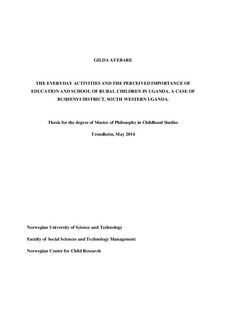The everyday activities and the perceived importance of education and school of rural children in Uganda, a case of Bushenyi District, South Western Uganda
Master thesis
Permanent lenke
http://hdl.handle.net/11250/297666Utgivelsesdato
2014Metadata
Vis full innførselSamlinger
Sammendrag
Education in Uganda is perceived to be the instrument of development. Uganda was one of
the first developing countries to introduce universal primary education (UPE). It is one of the
millennium development goals to be achieved by 2015. This research focuses on everyday
activities and the perceived importance of education and school of rural children in Uganda.
This explores, the daily activities children engage in, how daily activities, poverty and other
challenges affect their school life as well as what children think about their own future.
The main theory in this study is the social studies of childhood. Rural children’s social
relationships and cultures are worthy of study in their own right. Children are active in the
construction and determination of their own social lives. The paradigm seeks to understand
children as agents through involving them in research by share their experiences. Therefore,
In order to understand children experiences. I took children as my informants and their views
were taken seriously. My study took children’s as active participants as opposed to human
becoming.
Results of my study show that poverty and gender are major factors affecting boys and girls
education together with other factors like early marriages, poor health, lack of enough food,
orphan hood and its implications, large families, heavy punishments, disability, teacher-child
relationship and age. The study has found that work is part of rural children’s life in
Bushenyi. Children participate in house hold production as part of their socialization.
Children in rural Bushenyi are expected to contribute to family income and at the same time
learn the necessary skills that enable them to be active members of society. Children’s
participation is vital in ensuring their stay in school and completion of their studies. This
study determined that domestic work is part of their everyday life.
I recommend policy makers like government of Uganda and non-governmental organizations
(NGO’s) to provide scholastic materials to school going children. To also expand on poverty
eradication programs like National Agricultural Advisory Services (NAADS) and poverty
eradication Action Program.
